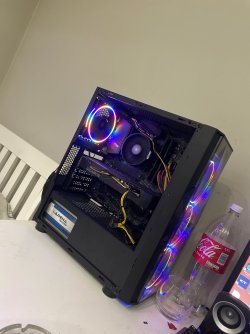- Joined
- Feb 1, 2019
- Messages
- 4,105 (1.73/day)
- Location
- UK, Midlands
| System Name | Main PC |
|---|---|
| Processor | 13700k |
| Motherboard | Asrock Z690 Steel Legend D4 - Bios 13.02 |
| Cooling | Noctua NH-D15S |
| Memory | 32 Gig 3200CL14 |
| Video Card(s) | 4080 RTX SUPER FE 16G |
| Storage | 1TB 980 PRO, 2TB SN850X, 2TB DC P4600, 1TB 860 EVO, 4TB WD SA510, 2x 3TB WD Red, 1x 4TB WD Red |
| Display(s) | LG 27GL850 |
| Case | Fractal Define R4 |
| Audio Device(s) | Soundblaster AE-9 |
| Power Supply | Antec HCG 750 Gold |
| Software | Windows 10 21H2 LTSC |
Do you have any spare components to hand, cpu, board or other sticks of ram?
Something is faulty, potentially poor pin contact on CPU, so reseating might be worth trying, try one slot at a time, one stick at a time. That sort of thing.
Something is faulty, potentially poor pin contact on CPU, so reseating might be worth trying, try one slot at a time, one stick at a time. That sort of thing.




